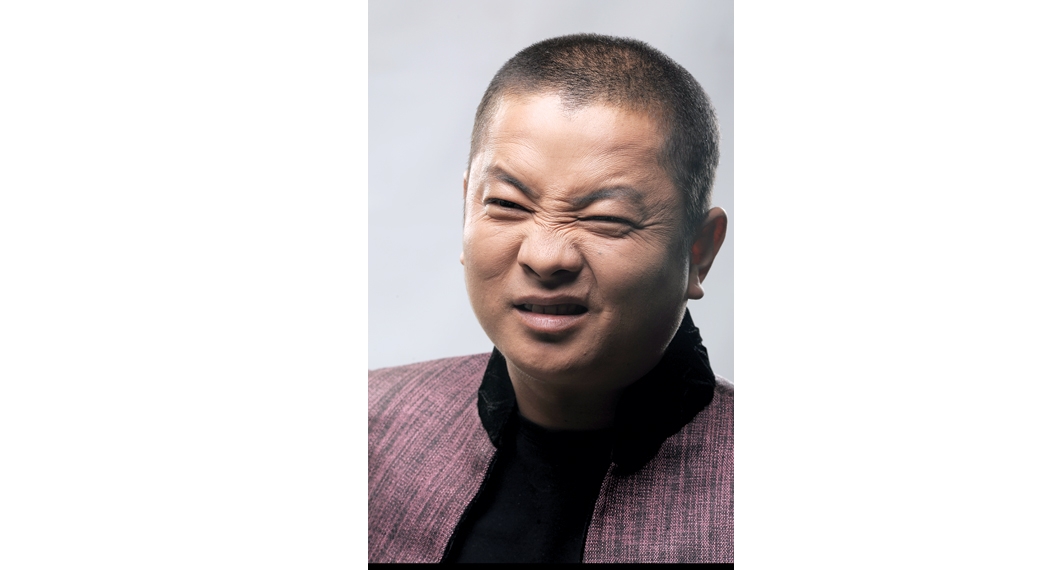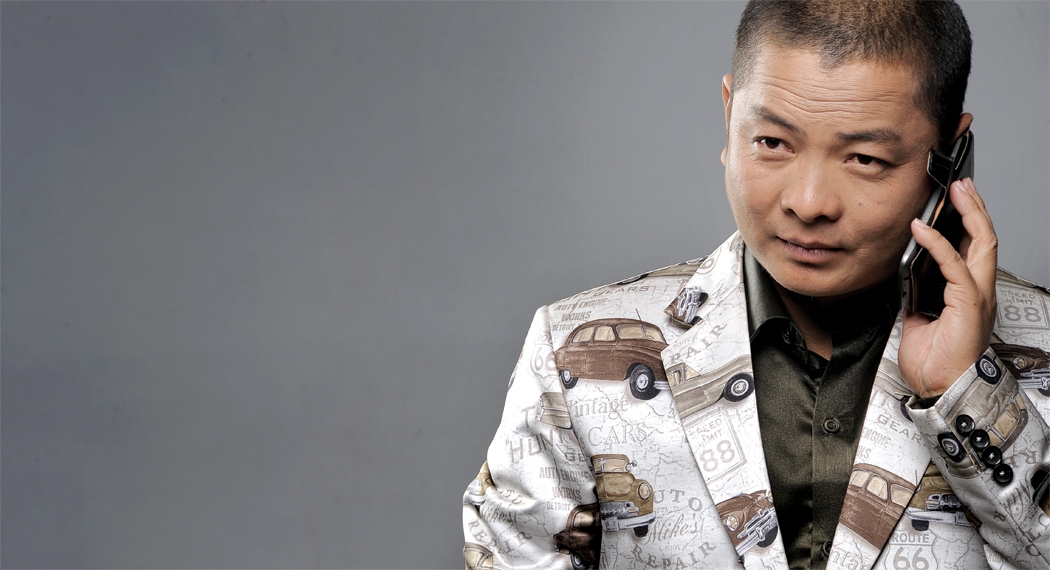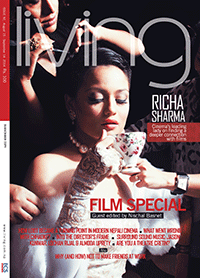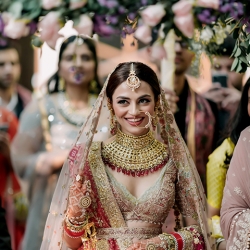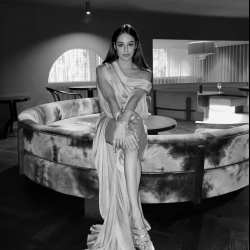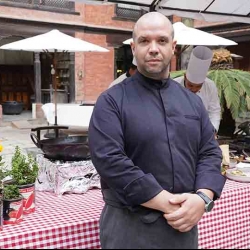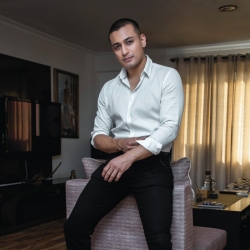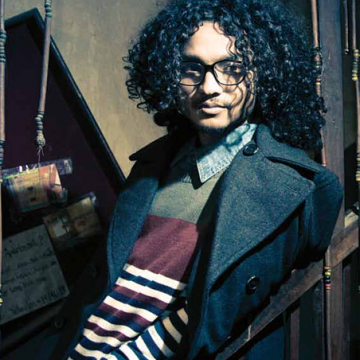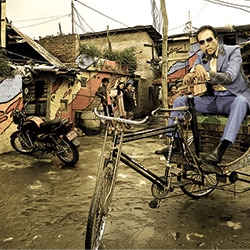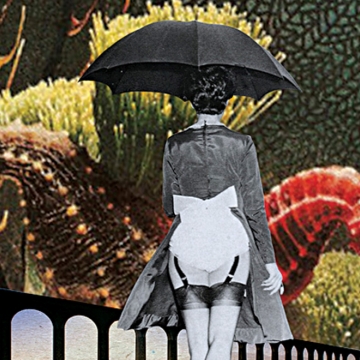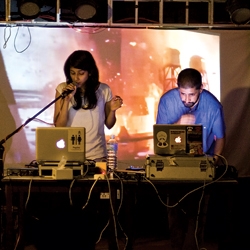Comedy doesn't come easy for films' most sought after funny man Dayahang Rai
“Comedy is the most difficult genre to perform on screen.” This coming from Dayahang Rai, one of the most sought after comedy actors of the nation as of today, is no less than a choking-on-the-chiya surprise that he has been kind enough to ask one of the spot boys to get for me. It is a sunny Wednesday in Kathmandu and we are on location for the shoot of his upcoming movie Zindabaad, a dark comedy of sorts, where Rai plays a mature police officer, constantly at odds with a younger muscle-man of the newer generation of officers.
The shoot begins on the outskirts of Thamel, in a predominantly Muslim locality. One can see fern-clad signs screaming ‘Chicken Biryani’ and ‘Aasma Halal Meat Center’ all around the tiny street. A large black camera, poised at the front of a small hotel, has attracted the attention of most locals who either peer from their windows or stop in their tracks as they pass by. Children dare each other to touch the camera and run away giggling. The afternoon sun is shielded by the close cluster of houses when Dayahang Rai emerges in character; clad in khaki pants and a thin purple shirt. His squints as he looks around and I wave from the sidelines when he smiles and fastens his stride to join me.
“Churot?” he asks.
I decline while he busies himself with a smoke.
“I know people picture me as a funny-man off screen too, but the truth is the most challenging role I have ever played until now was my character in Loot. Comedy is hard; I don’t think it comes naturally to me. I have to work on it continually to get the feel of the character in order to make him come alive.”
“Dayahang Sir!”
His director is gesturing him to begin the shot. The make-up man hurries and tries adding last minute contours to Rai’s plump face and emphasizing shadows under his eyes for that edgy look. Earlier, Rai was having white correction fluid dabbed strategically on his very short hair, when I had asked, mildly disturbed, “What if this doesn’t come off?”
Nonplussed, he replies “Dhuda najaos bhanerai lako ho!”
To the naïve eye, his short hair may seem like a preparation for his character as an officer. The truth, however, is that he recently had to face the untimely demise of his father. He looks forlorn as he narrates the sorry incident of how a dangerous drop of blood pressure proved fatal. In fact he just got back from Bhojpur, his hometown, a day before his shoot today.
He blows smoke absent-mindedly as he recalls those painful last few days, his eyes glassed over by the memory of the funeral. Silence clouds him until broken by another call from his director when he snaps back into the present, throws me a genial smile that seems to be more for my comfort than his own while stubbing out the cigarette and moving over to join his co-stars.
The scene in question is one where Rai, along with a few of his officers, raid a Mafia head’s prospective hangout. The Mafia head, being played by Suleiman Shankar of Iku fame, adds to the comic value of the movie. A small man in dreadlocks and aviators, he leaves Rai in peals of laughter as he joins the set in exaggerated goofiness. The masses recognize him instantly and call out to him, shouting out his alter-ego’s name and for a few minutes all one can hear is the deafening ‘Iku! Iku!’ from every corner of the street. Shankhar bows and basks in the attention as Rai looks on amused from the sidelines.
A resounding clap, the first of many, is heard signaling the beginning of the scene after the actors take their places and amidst being watched eagerly from all sides by people who are jostling still to be in the frame, the scene unfolds on camera.
Rai and the others are all dressed incognito in order to capture Suleiman “red-handed”, as the phrase goes. As the camera rolls rickety on its many wheels, the small side screen attached to it is zoomed in on Rai, his face down towards a lopsided held newspaper but his eyes flickering time and again behind him as Suleiman enters a small alleyway hotel, with his men guarding the entrance. Once he vanishes from sight, Rai casts away the paper and paces towards the entrance, his officers in tow. In a moment, he has one of the goons by his hair and a resounding slap is heard throughout when flesh hits flesh. The man staggers and falls, hand cupping his red cheek. Dayahang looks powerful and in control, not a trace of the memory of the earlier conversation. And ‘Cut!’
People have broken into whistles and enthusiastic clapping as the scene ends. The children whisper and mutter excitedly pointing at Rai, who is grinning at a job done well. In a few minutes, he has taken all the attention from the other actors and now everybody else is on the sidelines of his brilliance. However, he goes ahead and asks to look at the shot again. He looks intent at giving his best as he carefully watches his face bloom on the screen. He confides that he is his both best and worst critic and finds that personal subjectivity inevitably seeps into the character being played. If he were to enact the same scene tomorrow, it would turn out differently than it had now, so he tried to keep his mental processes in check in order to be able to portray the same emotive character throughout the movie.
A few takes later, a break is called on. A young boy runs around with plastic cups and tea in a tarnished silver kettle, whom Dayahang calls out to and obtains two glasses of steaming tea for us.
What is the first expensive thing that you bought yourself after your first commercially successful movie?
“Mandala Theatre,” replies a composed Rai. Mandala Theatre is the brainchild of Rai and a few other friends who pitched in to support the theatre scene in the country. He recounts his earlier days as a theatre artist, one who belonged to a small village on the outskirts of the city where he played the odd role that came his way until he found assistance under Anup Baral, who coached him into being an a theatre powerhouse and whom he recently joined hands with on the play Court Martial, that opened to packed audiences.
In between noiseless slurps of tea, he squints at the ground as he remembers how his first soap opera was never really aired and how he was also more interested in the direction of things rather than pure acting alone. His first directorial venture Maila.com, a play about a voyeuristic protagonist and his sexual maneuvers, had received largely negative responses initially due to its conflicting sexual content.
“I wanted to make a story that reflected parts of the oedipal complex in our everyday lives but the audience did not seem to be able to digest the idea. I tried using a lot of symbolism through colors and numbers and used very few actual lines, possibly another reason why it did not take off in the beginning. The first time I narrated the script to my mentor, he told me I had used elements of absurdism. To tell you the truth, I didn’t even know what that was!”
He then goes back in time and tells me how the folk stories his mother used to tell him as a child had had a deep impact on him, particularly which gave non-living entities a voice; the gurgling river or the angry sun. The pull of storytelling eventually threw him in the limelight but he went through palpable celluloid ignorance until his breakthrough in Loot which garnered enough spins on the box office to help him build Mandala, which he explains has also been a way of giving back to the industry that gave him eventually much to celebrate.
His new movie Jholey has been receiving largely positive responses and Rai’s work has been much applauded. However, it isn’t all comic this time. Rai is also seen romancing Priyanka Karki on-screen. How awkward would he say he finds engaging in on-screen romance?
Rai contemplates with a smirk as he answers that he feels incredibly awkward when the romance is ‘only’ for the sake of romance, but finds it easier to get into the character if that is exactly what the role demands.
Rai has been married for five years now and has a son of 15 months. Rai calls his wife, Benuka, his biggest support system and someone who had always been interested in his work ever since their younger days when they were both students of the arts, she studying music and he, theatre.
“Even though it was more or less what you would call a ‘love’ marriage, we still got married the traditional way, with me formally asking for her hand in marriage from her father. Magerai biha gareko ho hai!,” he exclaims genially.
His future plans, owing to the love he has for his family, all include them in the bigger picture. He has new movies and a play lined up, but is opposed to it crimping his time with his loved ones.
Suleiman Shankar joins me as Rai hurries to get himself another refill, looking for the caffeine induced kick as he is dressed thinly in the still cold February air. Shankar is ever the funny-man who can put anyone at ease instantly and goes on to talk about Rai and how they had previously met for other work before coming together for a feature film only now. He earnestly narrates how he thinks that Rai is a grounded actor and how any actor journeying from theatre to feature films does not really have any “air of greatness” about them. Rai, he says, is a very easy man to get along with, particularly on the sets, unlike those who come purely from money and believe themselves to be the center of the universe.
The scene to be shot next is that of Rai entering the building to pull on a raid on the supposed drug lord. As the camera rolls around on its track and Rai hardens his face into a stronger expression, the first thing that comes to mind is how this man transforms when the record button is pressed. He goes from becoming a mass background like everyone else to a certain someone with an intriguing story to tell.
It is obvious that Rai is not one of those hardened gym hitting maniacs that are a broad specimen present in every film industry, who in-fact have shaped our perception of how an actor should look like. Rai however, has embraced the pedestrian side in him, and confesses to loving doing films that focus on ordinary characters that have extraordinary lives. It is evident in the way that he stole everybody else’s thunder after the first take that this is man to be known by his work.
Again as Rai now readies himself to fling into the dark alleyway, all onlookers have forgotten about Iku or even the pretty actress nearby who has just arrived. Old men, fidgety children and giggly women who are looking from higher windows have now all fallen silent and now wait with baited breath to watch the officer below in action.


